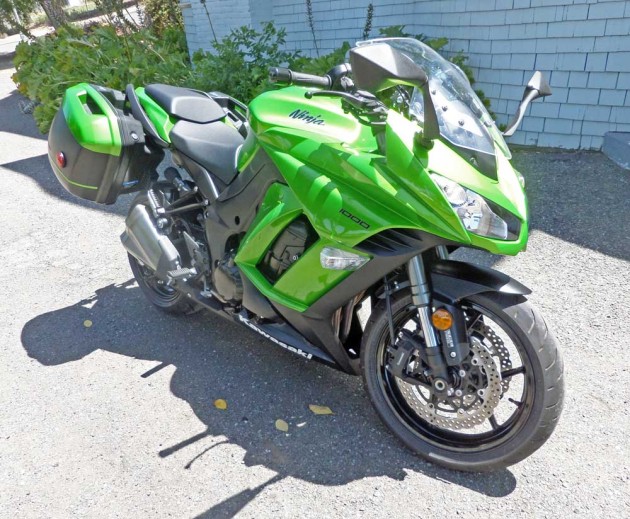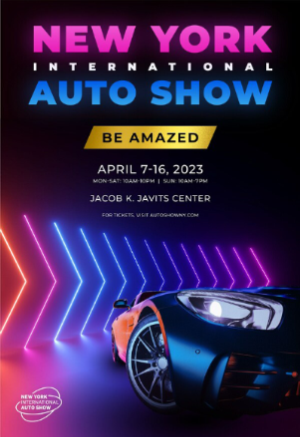?Kawasaki Ninja 1000 ABS Bagger?
Kawasaki?s venerable Ninja turns 30
Want a cool-looking, comfortable sport touring machine that has seen continual uprgrading and improvement over the past 30 years? What has now become the Kawasaki Ninja 1000 was born in Japan back in 1984 and was known as the GPZ900, which featured an all-new liquid-cooled four-cylinder that enabled it to outshine most of the large air-cooled machines of the era. By the time the GPZ900 arrived on our shores, Kawasaki?s marketing guru saw fit to change the name to ?Ninja?, probably inspired by the TV mini-series Shogun. That first Ninja was bigger, heavier, slower and less fuel efficient than today?s 2014 Kawasaki Ninja 1000 ABS bagger. Yes, it was also less expensive, but you get what you pay for, and the Kawasaki Ninja 1000 is not only cool and comfortable, its is a highly evolved machine.
This latest iteration Kawasaki Ninja 1000 is not really revolutionary, but it does have a lot of new and worthwhile features to offer. Its upgraded 1043cc four-stroke, liquid-cooled, DOHC, 16-valve inline four-cylinder engine with Direct Fuel Injection and four Keihin throttle bodies and oval sub-throttles delivers more power and torque for added capability and fun to ride quality. Horsepower is rated at 123 @ 10,340 while delivering 74.36 pound feet of torque at 7,350 rpm. The exhaust is a 4-into-2-pre-chamber-into 2 (dual side).
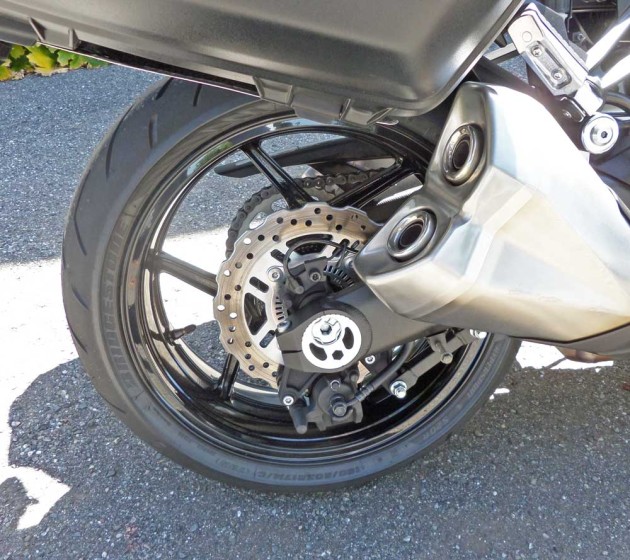
Power reaches the rear wheel through a smooth, six-speed sequential manual gearbox via X-Ring chain final drive. The 5-gallon fuel tank provides a substantial range for longer rides.
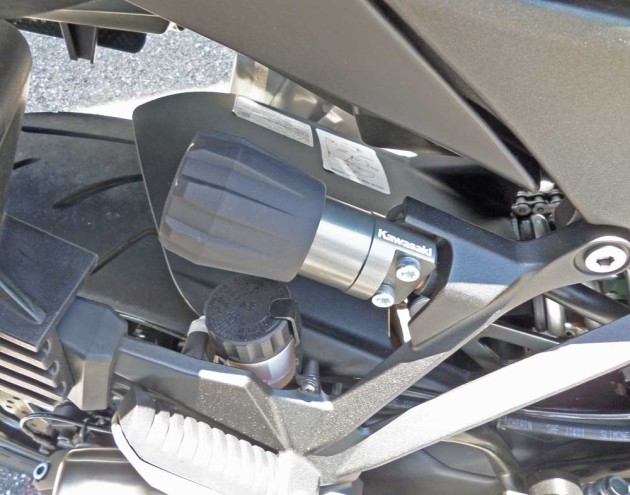
New features include: a KTRC Traction Control system with three different modes to maximize performance in different riding scenarios; new selectable Power Modes with a choice ranging from 50 percent to full power to suit the rider; One-piece ?monobloc? radial-mount front brake calipers with a Black Alumite finish and laser-etched Kawasaki logo; a taller 6th gear for more relaxing highway rides; a new analog and digital instrument cluster with a large tachometer and display that provides information on current bike conditions and settings; a unique new remote rear spring preload adjustment knob for quick, easy tuning to adapt to passenger and luggage weight; a new subframe featuring built-in compatibility for the new accessory saddlebags; and the new bags themselves which are lockable and easily removable.
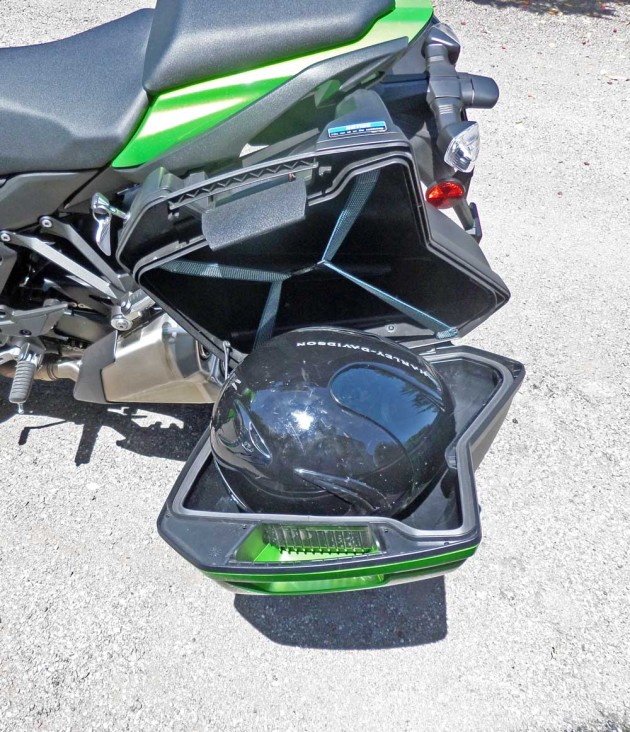
The Ninja 1000?s wheelbase measures 59.9 inches, and the overall length is 82.9 inches, and the seat height measures 32.3 inches. The bike tips the scale with a dry curb weight of 509.4 pounds.
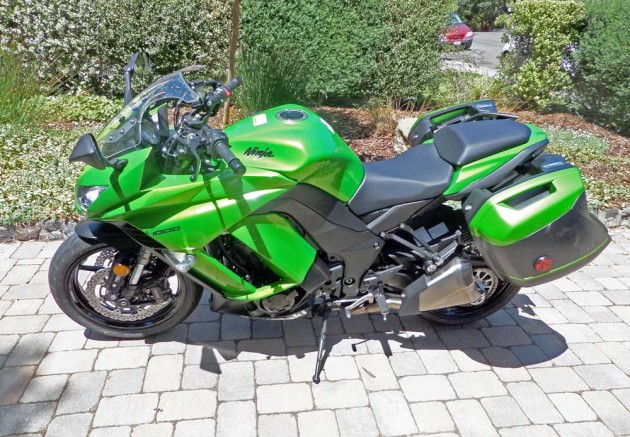
The Kawasaki Ninja 1000 rides on 41 mm inverted cartridge forks with stepless compression and rebound damping, with a fully adjustable spring preload and 4.7 inches of travel up front and a horizontal monoshock with stepless rebound damping and remotely adjustable spring preload along with 5.4 inches of travel in the rear. Rolling stock consists of Bridgestone Battlaxx rubber -120/70 ZR17 in the front and 190/50 ZR17 in the rear mounted on 3- ?V?-spoke black painted alloy wheels.
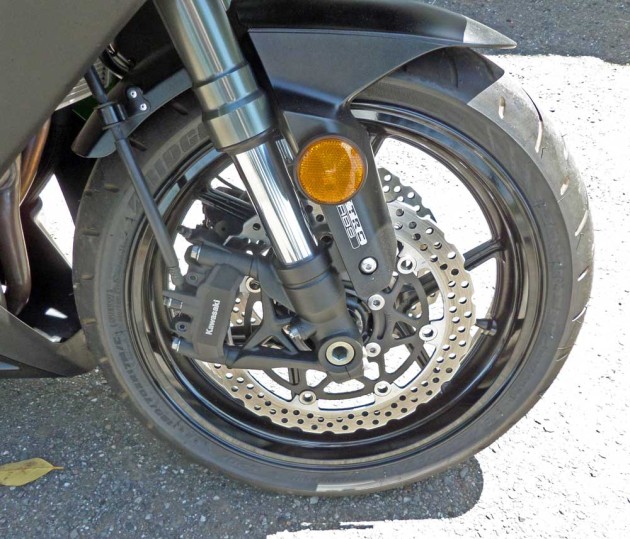
Reining in the Ninja 1000 is accomplished by dual 300mm petal-type rotors with radial-mount four-piston monobloc calipers and ABS brakes up front, and a Single 250mm petal-type rotor with single-piston caliper and ABS in the rear.

In terms of its appearance, the Kawasaki Ninja 1000 displays a supersport style full-fairing bodywork that gives it a distinctive, attention getting persona, while also providing wind and weather protection. Turn signals are incorporated into the fairing and the windshield has three available hand adjustable positions over a 20-degree span from sporty to maximum protection. The front fender adds to the aerodynamics and racy good looks. The tail cowl assembly is slim and compact and the design directs attention forward, with the slender rear fender lightening the look of the rear end. Instrumentation includes new LCD functions: KRC, Power Mode, ABS and Eco riding indicators. Additional LCD info includes: a digital speedometer, odometer, dual trip meter, clock, both instant and average fuel consumption, coolant temperature and low ?fuel warning lamps.
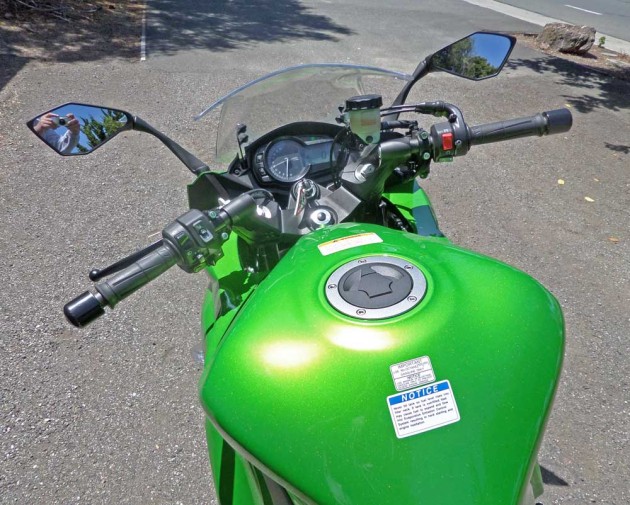
My test 2014 Kawasaki Ninja 1000 ABS Bagger was finished in Candy Lime Green metallic with Black trim elements ? a Candy Cascade Blue metallic is also available. The Base price was set at $11,999.00, while the as tested price was estimated at $13,518.75 (Accessory Bags = $1,269.75 / D&H $250) ? est.- dealer prep and handling may vary.
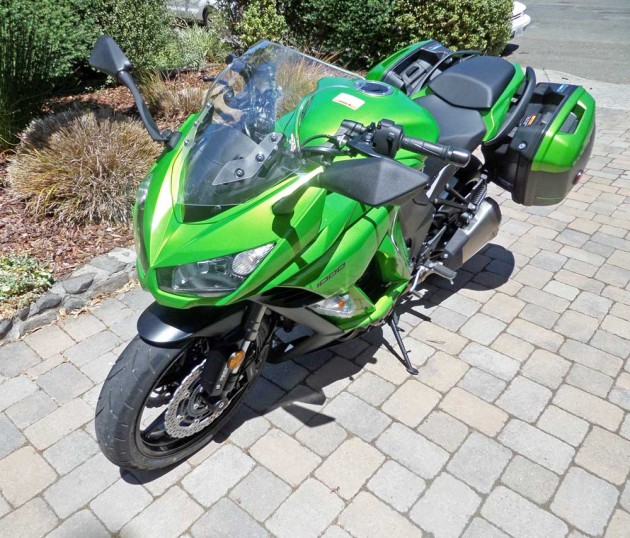
SUMMARY: The Ninja 1000 delivers the goods thanks to a more upright, comfortable riding position with separate raised handlebars featuring tapered grips mounted to the fork tube tops that extend above the top clamp. The seat, which is made of thick urethane has a height of 32.3 inches and it is fairly comfortable, particularly if you possess built-in natural posterior padding. If not, your backside may start to numb after 100 or so miles. There are knurled foot pegs for both rider and passenger, and there are new passenger grab bars, designed for a better, more comfortable hand-hold. The passenger pegs also incorporate convenient luggage hooks.
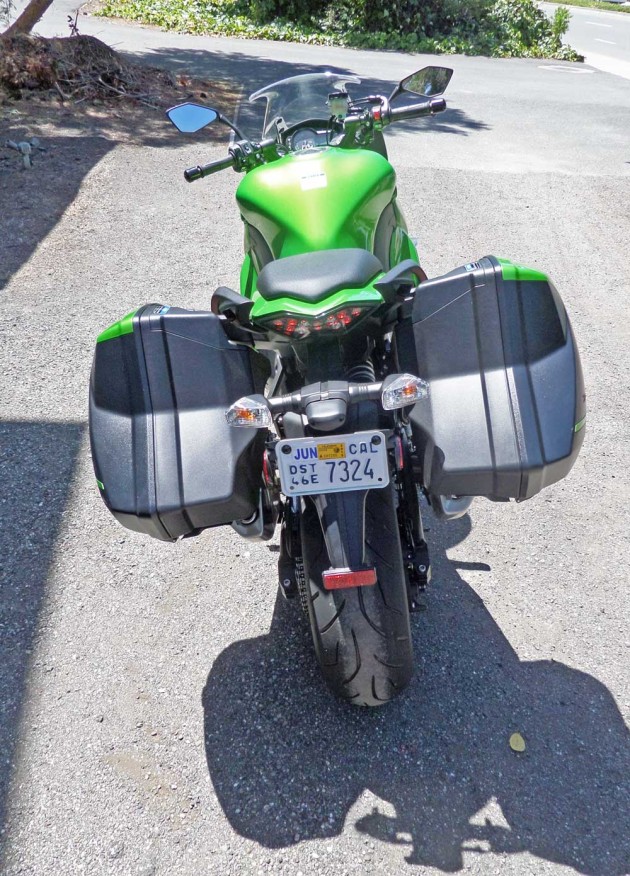
The left handlebar holds switches for KTRC Traction Control, Power Mode Selector, High/Low Beam headlight flasher. The directional signals are not self-canceling and there is unfortunately, no gear indicator, both of which would prove to be nice additions.
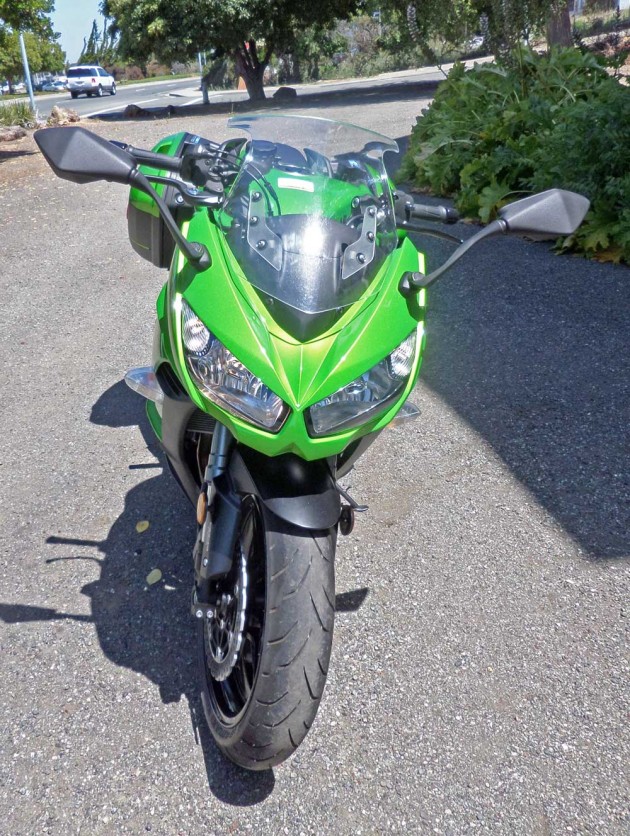
This new Ninja 1000 is fast ? very fast and smooth, very smooth. It is ergonomically correct to suit a number of rider statures, providing a just right riding posture. The torque range is very broad, but the bike is happiest in the higher rev limits, delivering the optimum level of power. The combined engine and exhaust melody is a steady, powerful thrum.
The bag design is ideal, but those with really long legs will have to focus on clearing them when mounting the bike. Bottom-line, the new Kawasaki Ninja 1000 ABS ?Bagger? represents an excellent value in a modern, practical liter bike.
[wptabs style=”wpui-light” effect=”slide” mode=”horizontal”]
?[wptabtitle] SPECIFICATIONS: 2014 Kawasaki Ninja1000 ABS [/wptabtitle]
?? [wptabcontent]
| Base Price: | $11,999.00 |
| Price as Tested: | $13,518.75 (Bags = $1,269.75 / D&H $250 – est. dealer prep and handling may vary. |
| Engine Type and Size: | 1043cc four-stroke, liquid-cooled, DOHC, 16-valve inline four-cylinder with Direct Fuel Injection and four Keihin throttle bodies and oval sub-throttles. |
| Horsepower (bhp): | 123 @ 10,340 rpm |
| Torque (ft./ lbs.): | 74.36 @ 7,530 rpm |
| Transmission: | Six-speed sequential manual. |
| Drive Train: | Six-speed sequential manual. |
| Suspension: |
Front – 41 mm inverted cartridge forks with stepless compression and rebound damping, adjustable spring preload and 4.7 inches of travel. Rear – Horizontal monoshock with stepless rebound damping, remotely adjustable spring preload and 5.4 inches of travel. |
| Brakes: | Dual 300mm petal-type rotors with radial-mount four-piston monobloc calipers and ABS up front / Single 250mm petal-type rotor with single-piston caliper, with ABS in the rear. |
| Tires: | Bridgestone Battlaxx 120/70 ZR17 front / 190/50 ZR17 rear mounted on 3- ”V”-spoke black painted alloy wheels. |
| Wheelbase: | 59.9 inches |
| Length Overall: | 82.9 inches |
| Curb Weight: | 82.9 inches |
| Fuel Capacity: | 5.0 gallons. |
| Seat Height: | 32.3 inches |
| 0 – 60 mph: | 2.6 seconds – Top speed 151 mph |
?? [/wptabcontent]
[/wptabs]
 Arv Voss is a Northern California based freelance motoring Journalist and member and past officer of several noted Automotive Journalist organizations who contributes regularly to a number of national and international media outlets. He reviews not only cars, trucks and SUVs, but motorcycles as well.
Arv Voss is a Northern California based freelance motoring Journalist and member and past officer of several noted Automotive Journalist organizations who contributes regularly to a number of national and international media outlets. He reviews not only cars, trucks and SUVs, but motorcycles as well.

